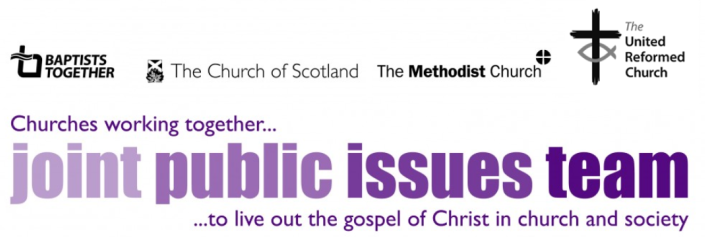Benefit changes criticised by churches
The Joint Public Issues Team releases statement condemning the Government’s new two-child limit as "deliberately ignoring" needs of some of the UK’s poorest children

From Thursday 6 April the Government’s flagship benefit, Universal Credit, will not offer help to the third or subsequent children in a family. This fundamentally changes the benefit system so that it “deliberately ignores” the needs of some of the UK’s more vulnerable children say Church leaders.
Over the next three years around 640,000 families containing at least two million children[1] will see substantially lower Universal Credit payments
From November 2018 the two-child limit will also be applied retrospectively. The needs of the third child born long before the two-child limit was thought of will also be ignored.
Rachel Lampard, Vice-President of the Methodist Conference, said, 'The two-child rule takes a knife to the social security safety net and hundreds of thousands of the UK's most vulnerable children will fall through the gap created.
'These cuts are the driving force behind the expected increases in child poverty over the next decade. The consequences for these children will last for a life-time.'
The Revd Dr Richard Frazer, Convener of the Church & Society Council, said, 'From Thursday payments under Universal Credit will deliberately ignore the needs of some of the UK’s poorest children. The Government’s flagship benefit will not offer help to the third or further children in a family.
'How can a decent society look at an impoverished child - and then ignore their needs?'
Both the Government's impact assessment [2] and Department of Work and Pensions (DWP) research make it clear that the two child limit is not expected to achieve its aim of reducing the number of children born to poorer families needing the support of the benefit system[3].
'We should be appalled that children’s needs are being deliberately ignored, no matter what the justification. It is extraordinary that the Government has pressed ahead with this cut despite the fact that its own research says that it is not likely to achieve its aim of encouraging families to have fewer children,' said Grace Pengelly, Secretary for Church and Society, United Reformed Church.
YouGov polling in October 2015 indicated that the majority (61 per cent) of UK adults believe benefits should be high enough to cover families' basic costs.
Speaking on the statistics, the Revd Stephen Keyworth, of the Baptist Union of Great Britain, added, 'This policy flies in the face of one of our benefit system’s founding principles – that families should have enough to meet their basic needs. Our churches believe this principle is important and polling indicates that the public believe this principle to be important too.
'The two-child limit recognises that larger families have additional needs, but chooses to ignore them. We urge the Government, even at this late stage, to hold to the founding principles of the benefit system and not deliberately ignore the needs of the most vulnerable children in society.'
The Joint Public Issues Team combines the expertise of the Baptist Union, the Church of Scotland, the Methodist Church and the United Reformed Church in the area of public issues, representing more than 800,000 people in the UK
In November 2015 the Joint Public Issues Team alongside Church Action on Poverty published the report 'Enough' to outline their opposition to rules, such as the 2-child rule, which recognise family's basic needs but deliberately refuse to meet them.
[1]
The two-child rule reduces maximum entitlement by £2,780 other changes on April 6 raise this to a £3,670 total loss: http://www.ekklesia.co.uk/node/23871
[2]
Welfare Reform and Work Bill: Impact Assessment of Tax Credits and Universal Credit, changes to Child Element and Family Element: http://www.parliament.uk/documents/impact-assessments/ia15-006e.pdf
[3]
DWP review of the effects of welfare policies on fertility, concluding “On balance the reviewed literature shows that there is no consistent and robust evidence to support claims that the welfare system has a significant impact upon family structure.”: http://webarchive.nationalarchives.gov.uk/20130314010347/http:/research.dwp.gov.uk/asd/asd5/rports2009-2010/rrep569.pdf
Baptist Times, 05/04/2017